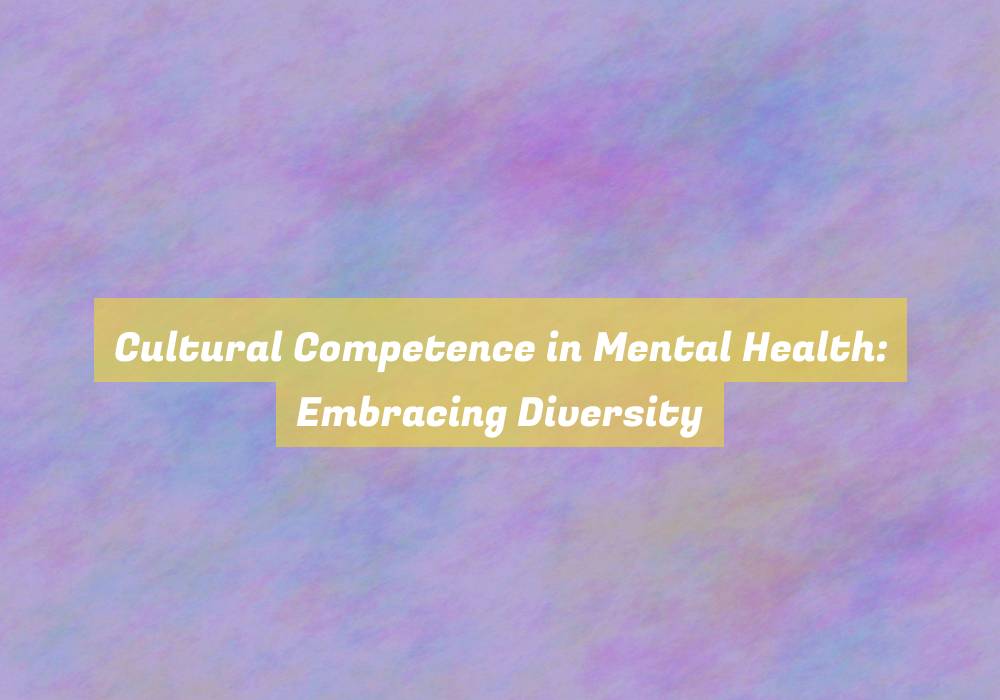Cultural Competence in Mental Health: Embracing Diversity
In the vast garden of mental health, cultural competence acts as the fertile soil that nurtures understanding and empathy. ItG??s the key to unlocking the potential for meaningful connections and effective treatment.
As you navigate the complex terrain of diverse backgrounds and beliefs in the realm of mental health, youG??ll find that embracing cultural competence is not just a choice, but a necessity. ItG??s the cornerstone of providing truly impactful care to individuals from all walks of life.
But how exactly does one cultivate this competence, and what are the far-reaching benefits it brings?
Understanding Cultural Competence
Understanding cultural competence is essential for mental health professionals to effectively engage with diverse clients and provide appropriate care. It involves being aware of your own cultural beliefs and values, as well as acknowledging and respecting the cultural differences of others. By understanding cultural competence, you can actively work to eliminate biases and stereotypes that may impact your interactions with clients from different backgrounds. It also means being open to learning about different cultural practices, beliefs, and communication styles, which can greatly enhance your ability to connect with and support clients from diverse backgrounds.
Developing cultural competence requires ongoing education and self-reflection. ItG??s important to continuously educate yourself about different cultures and seek out training opportunities to enhance your cultural awareness. Additionally, reflecting on your own cultural background and how it may influence your perspectives can help you better understand and connect with clients from diverse backgrounds. By actively engaging in this process, you can create a more inclusive and supportive environment for all clients, ultimately improving the quality of care you provide.
Impact of Cultural Diversity
Acknowledging and embracing cultural diversity in mental health practice is crucial for fostering inclusive and effective care for clients from varied backgrounds. The impact of cultural diversity in mental health canG??t be overstated.
Cultural diversity influences individualsG?? perceptions of mental health, help-seeking behaviors, and attitudes toward treatment. It affects how symptoms are expressed and how individuals communicate distress. Furthermore, cultural diversity shapes the stigma surrounding mental health within different communities, impacting the willingness to seek help and engage in treatment.
Moreover, cultural diversity influences the types of support systems and coping mechanisms individuals may rely on, which can significantly impact their mental health outcomes.
Understanding the impact of cultural diversity is essential for mental health practitioners to provide culturally responsive care. It requires recognizing the unique cultural factors that influence an individualG??s mental health and well-being.
Strategies for Incorporating Diversity
To effectively incorporate diversity in mental health practice, consider implementing culturally sensitive assessment tools and protocols to better understand the unique needs of your clients. Utilize assessment instruments that have been validated with diverse populations to ensure that youG??re accurately capturing the experiences and concerns of individuals from different cultural backgrounds.
Additionally, itG??s important to actively seek out education and training on cultural competence to enhance your understanding of the various cultural factors that may impact mental health. Engage in ongoing learning about different cultural practices, beliefs, and values, and how these may influence an individualG??s perception of mental illness and help-seeking behaviors.
Furthermore, creating a diverse and inclusive environment within your practice is crucial. This can be achieved by recruiting a diverse team of mental health professionals who can offer culturally informed care to a wide range of clients. Emphasize the importance of cultural humility and open communication within your team to foster an environment where diverse perspectives are valued and respected.
Lastly, establish partnerships with community organizations and leaders from diverse backgrounds to ensure that your practice is accessible and welcoming to individuals from all cultural backgrounds.
Benefits of Culturally Competent Care
Incorporating diversity in mental health practice through culturally sensitive assessment tools and protocols not only enhances your understanding of clientsG?? unique needs but also leads to numerous benefits of culturally competent care.
By embracing cultural competence, youG??re better equipped to establish trust and rapport with clients from diverse backgrounds. This, in turn, can lead to improved client satisfaction and treatment adherence.
Culturally competent care also allows you to tailor interventions to align with clientsG?? cultural beliefs and values, increasing the likelihood of positive treatment outcomes. Additionally, it enables you to address cultural stigma and discrimination, promoting a more inclusive and supportive therapeutic environment.
Embracing diversity in mental health practice can also enhance your professional growth by expanding your knowledge of different cultural practices and worldviews. Furthermore, culturally competent care can help in reducing disparities in mental health outcomes among diverse populations, ultimately contributing to the overall well-being of the community.
Conclusion
In conclusion, embracing cultural competence in mental health is essential for providing effective and inclusive care. Understanding the impact of cultural diversity and incorporating strategies to address it allows for better communication and understanding with clients.
The benefits of culturally competent care are vast, leading to improved outcomes and client satisfaction. By valuing diversity and implementing culturally sensitive practices, mental health professionals can create a more supportive and inclusive environment for all individuals.







I really appreciate this exploration of cultural competence in mental health. It’s such an essential topic, especially given the increasingly diverse environments we live and work in. It makes me reflect on my own experiences—how my cultural background informs my worldview and interactions, and the misunderstandings that can arise when there’s a lack of awareness on either side.
It’s great to hear that this topic resonates with you. Cultural competence truly plays a crucial role in mental health, especially as we navigate our increasingly diverse settings. I often find myself considering how deeply our backgrounds shape our perspectives, not just in personal interactions, but also in how we approach issues like mental health care.
This piece really dives into the importance of cultural sensitivity in mental health, offering valuable insights that resonate with our diverse experiences and the challenges they bring.
‘Cultural Sensitivity in Mental Health: Bridging Differences’
https://www.global-ehealth-forum.com/2023/10/17/cultural-sensitivity-in-mental-health-bridging-differences/.
You raise some important points about the connection between our backgrounds and how we perceive mental health. It’s fascinating how our cultural experiences shape not only our individual perspectives but also the dynamics in mental health care settings. This can definitely influence how we communicate and connect with mental health professionals.
Your analogy of cultural competence as the fertile soil nurturing understanding in mental health really resonates with me. It reminds me of a recent experience where a mental health workshop I attended emphasized the importance of listening to clients’ stories without judgment. This practice not only fostered a deeper connection but also highlighted the unique ways cultural backgrounds inform individual experiences of mental health.